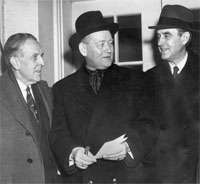Dirk Stikker
| Dirk Stikker | |
|---|---|
 Dirk Stikker in 1964 | |
| Minister of Foreign Affairs | |
|
In office 7 August 1948 – 2 September 1952 | |
| Preceded by | Pim van Boetzelaer van Oosterhout |
| Succeeded by | Jan Willem Beyen |
| 3rd Secretary General of the NATO | |
|
In office 21 April 1961 – 1 August 1964 | |
| Preceded by | Paul-Henri Spaak |
| Succeeded by | Manlio Brosio |
| Personal details | |
| Born |
5 February 1897 Winschoten, Netherlands |
| Died |
23 December 1979 (aged 82) Wassenaar, Netherlands |
| Political party | Freedom Party (PvdV), People's Party for Freedom and Democracy (VVD) |
Dirk Uipko Stikker, GBE, GCVO (5 February 1897 – 23 December 1979) was a Dutch banker, industrialist, politician, and diplomat.
Born in Winschoten, he studied law at the University of Groningen. After his studies he began a career in the banking sector. In 1935, he became director of Heineken International, the famous beer company. He held this post until 1948.
In 1945, he was among the organizers of the Stichting van de Arbeid (Dutch Labour Foundation), thus helping to lay the foundation of post-war collective bargaining in the Netherlands.
In 1964, Stikker was awarded an honorary doctorate by Brown University. He died in Wassenaar in 1979, aged 82.
Political career

Stikker entered politics in 1945, when he was elected to the Senate of the States General. On 23 March 1946, he co-founded the Partij van de Vrijheid (PvdV, Freedom Party), together with some former members of the pre-war Liberale Staatspartij (LSP, Liberal State Party). On 24 January 1948, the PvdV was absorbed by the Volkspartij voor Vrijheid en Democratie (VVD, Peoples Party for Freedom and Democracy), which is as of 2004 the country's most important Liberal party. Stikker was the VVD's first chairman.
Minister of Foreign Affairs
In 1948, Stikker became minister of foreign affairs in the first government led by Willem Drees, holding that position until 1951. After his party adopted a no-confidence motion over the government's colonial policy in New Guinea, Stikker resigned on 23 January 1951, prompting the cabinet's fall. He returned to that position less than two months later. The Netherlands played an important role in the creation of NATO and the European Coal and Steel Community during Stikker's time in office as minister of foreign affairs.
Later political roles
After his ministerial office, Stikker was ambassador to the United Kingdom (1952–1958) and head of the Dutch Permanent Representation to the North Atlantic council and to the Organization for European Economy Co-operation, the predecessor of the OECD (1958–1961). On 21 April 1961, he succeeded Paul-Henri Spaak, to become the third Secretary General of NATO. He resigned due to poor health on 1 August 1964.
Further reading
- Wilsford, David, ed. Political leaders of contemporary Western Europe: a biographical dictionary (Greenwood, 1995) pp. 427-32.
